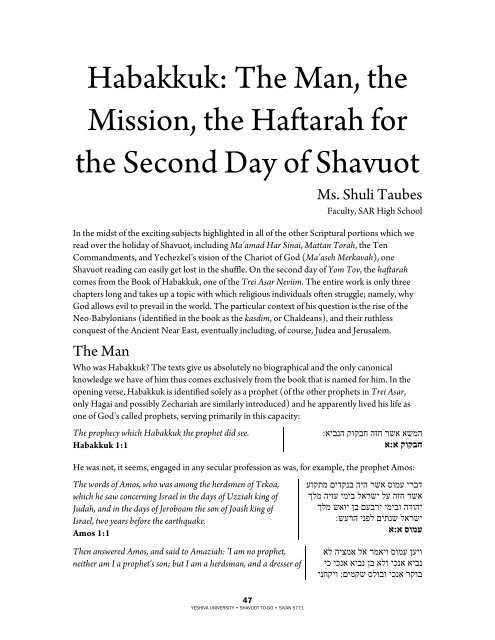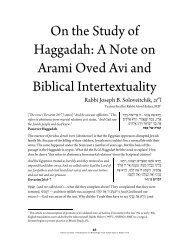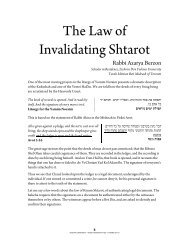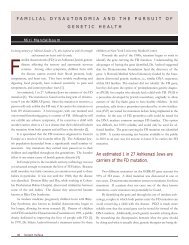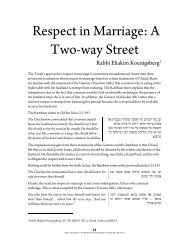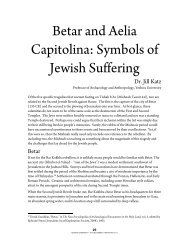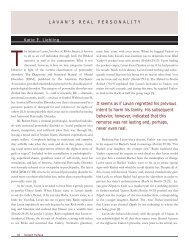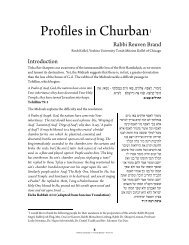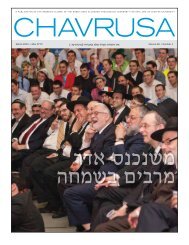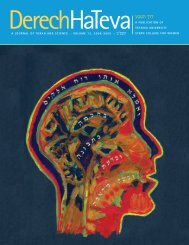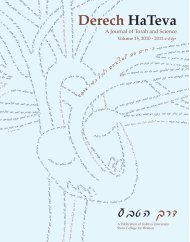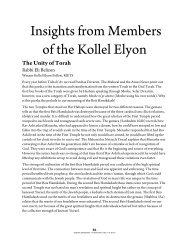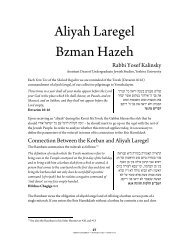You also want an ePaper? Increase the reach of your titles
YUMPU automatically turns print PDFs into web optimized ePapers that Google loves.
Habakkuk: The Man, the<br />
Mission, the Haftarah for<br />
the Second Day of Shavuot<br />
47<br />
YESHIVA UNIVERSITY • SHAVUOT TO-GO • SIVAN 5771<br />
<strong>Ms</strong>. <strong>Shuli</strong> <strong>Taubes</strong><br />
Faculty, SAR High School<br />
In the midst of the exciting subjects highlighted in all of the other Scriptural portions which we<br />
read over the holiday of Shavuot, including Ma’amad Har Sinai, Mattan Torah, the Ten<br />
Commandments, and Yechezkel’s vision of the Chariot of God (Ma’aseh Merkavah), one<br />
Shavuot reading can easily get lost in the shuffle. On the second day of Yom Tov, the haftarah<br />
comes from the Book of Habakkuk, one of the Trei Asar Neviim. The entire work is only three<br />
chapters long and takes up a topic with which religious individuals often struggle; namely, why<br />
God allows evil to prevail in the world. The particular context of his question is the rise of the<br />
Neo-Babylonians (identified in the book as the kasdim, or Chaldeans), and their ruthless<br />
conquest of the Ancient Near East, eventually including, of course, Judea and Jerusalem.<br />
The Man<br />
Who was Habakkuk? The texts give us absolutely no biographical and the only canonical<br />
knowledge we have of him thus comes exclusively from the book that is named for him. In the<br />
opening verse, Habakkuk is identified solely as a prophet (of the other prophets in Trei Asar,<br />
only Hagai and possibly Zechariah are similarly introduced) and he apparently lived his life as<br />
one of God’s called prophets, serving primarily in this capacity:<br />
The prophecy which Habakkuk the prophet did see.<br />
Habakkuk 1:1<br />
: איבנה<br />
קוקבח הזח רשא אשמה<br />
א:<br />
א קוקבח<br />
He was not, it seems, engaged in any secular profession as was, for example, the prophet Amos:<br />
The words of Amos, who was among the herdsmen of Tekoa,<br />
which he saw concerning Israel in the days of Uzziah king of<br />
Judah, and in the days of Jeroboam the son of Joash king of<br />
Israel, two years before the earthquake.<br />
Amos 1:1<br />
Then answered Amos, and said to Amaziah: 'I am no prophet,<br />
neither am I a prophet's son; but I am a herdsman, and a dresser of<br />
עוקתמ םידקנב היה רשא סומע ירבד<br />
ךלמ היזע ימיב לארשי לע הזח רשא<br />
ךלמ שאוי ןב םעברי ימיבו הדוהי<br />
: שערה ינפל םיתנש לארשי<br />
א:<br />
א סומע<br />
אל היצמא לא רמאיו<br />
סומע ןעיו<br />
יכ יכנא איבנ ןב אלו יכנא איבנ<br />
ינחקיו<br />
: םימקש סלובו יכנא רקוב
sycamore-trees; and the Lord took me from following the flock, and<br />
the Lord said to me: Go, prophesize to My people Israel.<br />
Amos 7:14-15<br />
48<br />
YESHIVA UNIVERSITY • SHAVUOT TO-GO • SIVAN 5771<br />
ךל 'ה<br />
ילא רמאיו ןאצה ירחאמ 'ה<br />
: לארשי ימע לא אבנה<br />
וט-די:<br />
ז סומע<br />
Amos clearly was not a prophet by trade, but a herdsman and a dresser of sycamore trees who<br />
was called by God for a particular mission. Habakkuk, on the other hand, as the first passuk<br />
seems to indicate, was a prophet by profession. It is therefore likely that he in fact said much<br />
more than merely that which is contained in the three chapters of this Book, but it is only this<br />
small selection that has been preserved and was canonized in Tanakh.<br />
Some have deduced from the final statement of the book that Habakkuk was also a Levite and a<br />
member of the Temple choir, or that he was in some other way connected with the Temple<br />
worship in Jerusalem (see, for example, the comment of Rashi there):<br />
God, the Lord, is my strength, and He makes my feet like hinds' feet, and<br />
He makes me walk upon my high places. For the Leader. With my stringmusic.<br />
Habakkuk 3:19<br />
There is, however, no other definitive evidence of this.<br />
ילגר םשיו יליח ינדא 'ה<br />
ינכרדי יתומב לעו תוליאכ<br />
: יתוניגנב חצנמל<br />
טי:<br />
ג קוקבח<br />
One thing we do know for certain, of course, is his name, Habakkuk, which probably comes from<br />
the Hebrew root “קבח,” meaning “to embrace.” At the end of his book, it becomes clear that this<br />
name is indeed an appropriate one for a man who chooses to embrace and cling to God<br />
regardless of the current political circumstances and despite what is happening to his people, as<br />
will be discussed below.<br />
In light of this etymology of Habakkuk’s name, there is an interesting passage in the Zohar<br />
(I:7b) according to which Habakkuk was the son of the Shunammite woman mentioned in II<br />
Kings Chapter 4. Scripture relates that the prophet Elisha had made a habit of staying as a guest<br />
at the home of a certain woman, referred to by the text simply as the Shunammite woman,<br />
whenever he passed through the town of Shunem. This woman, out of tremendous respect for<br />
the man of God, built Elisha his own room so that he might be comfortable whenever he came to<br />
stay with her and her husband. Elisha, wanting to show his gratitude to this kind woman, asked<br />
her if there might be something which he, being in a position of power, could do for her. Despite<br />
her demurring and expressing her contentment with life, Elisha, upon being told that she had no<br />
children, said that within a year she would in fact give birth to a son.<br />
And he said: 'At this season, when the time comes round, you<br />
shall embrace a son.' And she said: 'No, my lord, man of God,<br />
do not lie to your handmaid.'<br />
II Kings 4:16<br />
תקבח תא היח תעכ הזה דעומל רמאיו<br />
לא םיהלאה שיא ינדא לא רמאתו ןב<br />
: ךתחפשב בזכת<br />
זט:<br />
ד ב םיכלמ<br />
A son is indeed born to the woman as Elisha had promised, but the boy unexpectedly and<br />
tragically dies as a young child. His mother, however, refuses to accept his demise and eventually<br />
Elisha himself resurrects the child. Apparently struck by the odd formulation of Elisha’s
prediction, " ןב תקבח תא"<br />
– “you shall embrace a son,” rather than the more usual formulation,<br />
“you shall bear a son” or “a son shall be born to you,” the rabbis suggests that the particular usage of<br />
this verb hints that this young child eventually grew up to be the prophet Habakkuk.<br />
This narrative shares many similarities with the stories of other barren women in Tanakh, such<br />
as Sarah, Rachel, the wife of Manoach, and Hannah. Yet there is a striking difference. In all of<br />
those other cases, the child of the formerly barren woman grows up to play a major role in the<br />
destiny of the Jewish people as a father or a leader. The Shunammite woman’s child, on the other<br />
hand, remains, like his mother, unnamed, and according to the text assumes no significant<br />
position in the history of Israel. The above interpretation, however, allows for this particular gap<br />
to be filled, stating that the child of the Shunammite woman as well was indeed a major figure<br />
who impacted Jewish thought and with whom God had an intimate relationship, namely, the<br />
prophet Habakkuk.<br />
Two other traditions relating to the identity of Habakkuk bear mention here. Each has its own<br />
proofs and can be examined closely; what follows is a brief summary.<br />
Some identify Habakkuk with the “watchman” described by the prophet Yeshaya. This is based<br />
on a possible connection between the verse describing the job of this watchman and a<br />
declaration made by Habakkuk himself:<br />
For thus has the Lord said to me: Go, set a<br />
watchman; let him declare what he sees!<br />
Isaiah 21:6<br />
I will stand upon my watch, and set me upon the tower, and will<br />
look out to see what He will speak by me, and what I shall answer<br />
when I am reproved.<br />
Habakkuk 2:1<br />
49<br />
YESHIVA UNIVERSITY • SHAVUOT TO-GO • SIVAN 5771<br />
הארי רשא הפצמה דמעה ךל ינדא ילא רמא הכ יכ<br />
: דיגי<br />
ו:<br />
אכ והיעשי<br />
לע הבציתאו הדמעא יתרמשמ לע<br />
יב רבדי המ תוארל הפצאו רוצמ<br />
: יתחכות לע בישא המו<br />
א:<br />
ב קוקבח<br />
Moreover, the prophecies of Yeshaya deal with certain issues that are very much like those dealt<br />
with in Habakkuk and certain additional parallels can be identified.<br />
Further legendary biographical material may be extracted from the pages of the Apocryphal<br />
book Bel and the Dragon (verses 33-42). The tale of Bel and the Dragon was incorporated as<br />
Chapter 14 of the extended Book of Daniel. (There are a number of sections of Daniel that are<br />
included in the Septuagint translation of that book which are not found in our Masoretic text,<br />
and are thus considered Apocrypha; this is one example.) It is thought to have been written in<br />
Aramaic around the late second century BCE. In this particular section, an angel carries the<br />
prophet Habakkuk by his hair to Babylon to bring food to Daniel in the lions’ den:<br />
Now the prophet Habakkuk was in Judea; he had made a stew and crumbled bread into the bowl,<br />
and he was on the way to his field, carrying it to the reapers, when an angel of the Lord said,<br />
'Habakkuk, carry the meal you have with you to Babylon, for Daniel, who is in the lion-pit.'<br />
Habakkuk said, 'My Lord, I have never been to Babylon. I do not know where the lion-pit is.' Then<br />
the angel took the prophet by the crown of his head, and carrying him by his hair, he swept him to<br />
Babylon with the blast of his breath and put him down above the pit. Habakkuk called out,
'Daniel, Daniel, take the meal that God has sent you! 'Daniel said, 'O God, thou dost indeed<br />
remember me; thou dost never forsake those who love thee.' Then he got up and ate; and God's<br />
angel returned Habakkuk at once to his home. On the seventh day the king went to mourn for<br />
Daniel, but when he arrived at the pit and looked in, there sat Daniel! Then the king cried aloud,<br />
'Great art thou, O Lord, the God of Daniel, and there is no God but thou alone.' So the king drew<br />
Daniel up; and the men who had planned to destroy him he flung into the pit, and then and there<br />
they were eaten up before his eyes.<br />
We are, in general, infinitely curious about Biblical personalities. The rabbinic commentators<br />
from the Midrash and on thus grasp onto every thread which might give us some insight into any<br />
information about a character, especially one to whom we, reading Tanakh so many years later,<br />
turn to for guidance and reflection. In the Book of Habakkuk, we have an extremely powerful<br />
prophecy and some beautiful and complex writing and thought, and yet we are left to wonder –<br />
who was this man behind the prophecy? At first blush, as mentioned above, we seem to get no<br />
biographical information at all. We do not even know his father’s name! All we know for sure is<br />
that he was a prophet.<br />
Historical Background<br />
When did Habakkuk present this prophecy? To what was he responding? To whom was he<br />
speaking? What is the context? Once again, we have so little textual information that it is hard to<br />
be sure about any of this either. In the case of many prophets, the text itself provides a certain<br />
amount of historical context, often identifying the king during whose reign he prophesied, but<br />
there is no such information given about Habakkuk. Many of the classical commentaries, based<br />
on an earlier rabbinic statement (see Seder Olam Chapter 20 and Yalkut Shimoni on the opening<br />
passuk), say that Habakkuk prophesied during the reign of the evil Judean king Menasheh, in the<br />
middle of the 7th century BCE. Menasheh was a king who did that which was “evil in the eyes of<br />
the Lord” (II Kings 21:2), reversing the religious reforms of his great father Chizkiyahu, and<br />
reinstating pagan worship in Jerusalem and the Temple. This took place many years before the<br />
Chaldeans (later to be known as the Babylonians) came to power; Habakkuk’s prophecy is thus<br />
about the future rise to power of Nebuchadnezzar.<br />
Other commentaries, as well as more modern scholars, place the prophet Habakkuk in the late<br />
7 th century BCE, after the Babylonians had already defeated the Assyrian empire and not long<br />
before the Babylonians’ siege and capture of Jerusalem; he thus lived during the time of the<br />
events which he is describing.<br />
At issue is the following statement:<br />
For I raise up the Chaldeans, that bitter and impetuous nation,<br />
that march through the breadth of the earth to possess dwellingplaces<br />
that are not theirs.<br />
Habakkuk 1:6<br />
50<br />
YESHIVA UNIVERSITY • SHAVUOT TO-GO • SIVAN 5771<br />
רמה יוגה םידשכה תא םיקמ יננה יכ<br />
תשרל ץרא יבחרמל ךלוהה רהמנהו<br />
: ול אל תונכשמ<br />
ו:<br />
א קוקבח<br />
According to the second group of the aforementioned commentaries and scholars, this verse<br />
should be read in the present tense. The reference to the rise and advance of the Chaldeans in
this and the following five verses thus possibly places Habakkuk during the reign of Yehoyakim,<br />
from 609-598 BCE, as it was during his reign that the Babylonians were indeed growing in<br />
power. The Babylonians actually marched against Jerusalem in 598 BCE (at which time the elite<br />
members of the Jewish community were exiled; see II Kings 24:14); Yehoyakim died while the<br />
Babylonians were advancing upon Jerusalem and his son Yehoyachin, who was 18 years old at<br />
the time, assumed the throne. Only a short time after the Babylonians had reached Jerusalem,<br />
Yehoyachin and his advisors surrendered the city. This understanding of when Habakkuk lived<br />
allows for a reading of the text which demonstrates Habakkuk’s sense of a personal and intimate<br />
knowledge of the Babylonian brutality.<br />
Are You not from everlasting, O Lord my God, my Holy One? Let us<br />
not die. O Lord, You have ordained them for judgment, and You, O<br />
Rock, have established them for correction. You that are of eyes too<br />
pure to behold evil, and that can not look on mischief, wherefore do<br />
You look when they deal treacherously, and hold Your peace when<br />
the wicked swallow up the man that is more righteous than he; And<br />
[you] make men as the fish of the sea, as the creeping things, that<br />
have no ruler over them. They take up all of them with the angle, they<br />
catch them in their net, and gather them in their drag; therefore they<br />
rejoice and exult. Therefore they sacrifice to their net, and offer to<br />
their drag; because through them their portion is fat and their food<br />
plenteous. Shall they therefore empty their net, and without<br />
compassion slay the nations continually?<br />
Habakkuk 1:12-17<br />
51<br />
YESHIVA UNIVERSITY • SHAVUOT TO-GO • SIVAN 5771<br />
ישדק יהלא 'ה<br />
םדקמ התא אולה<br />
רוצו ותמש טפשמל 'ה<br />
תומנ אל<br />
םיניע רוהט : ותדסי חיכוהל<br />
אל למע לא טיבהו ער תוארמ<br />
שירחת<br />
םידגוב טיבת המל לכות<br />
השעתו : ונממ קידצ עשר עלבב<br />
לשמ אל שמרכ םיה יגדכ םדא<br />
והרגי הלעה הכחב הלכ : וב<br />
ןכ לע ותרמכמב והפסאיו ומרחב<br />
ומרחל חבזי ןכ לע : ליגיו חמשי<br />
ןמש המהב יכ ותרמכמל רטקיו<br />
ןכ לעה : הארב ולכאמו וקלח<br />
אל םיוג גרהל דימתו ומרח קירי<br />
: לומחי<br />
זי-בי:<br />
א קוקבח<br />
Within a period of approximately 20 years, the Chaldeans swept over the Kingdom of Judea in<br />
successive waves and ultimately destroyed the country and took all but a tiny number of its<br />
inhabitants away into captivity in 586 BCE. In addition, of course, they destroyed the Temple.<br />
Throughout this time, the people of Judea were struggling with both religious and social decay<br />
and confusion, as the prophet Yirmiyahu makes clear in his prophecies at that time; it is perhaps<br />
in this context that Habakkuk too flourishes.<br />
Outline of the Book of Habakkuk – The Mission<br />
Chapter 1 contains an outline of Habakkuk’s central problem of theodicy, questioning how God<br />
can allow evil to prevail in this world. This is a different kind of theodicy question than that<br />
which we are familiar with from the Book of Iyov, which will be discussed below; here the<br />
prophet takes issue with how God could allow evil in the form of the Chaldeans, or neo-<br />
Babylonians, to triumph without end. This chapter is a description of faith in a state of conflict.<br />
Chapter 2 contains God’s response to that problem and Chapter 3 is a prayer/psalm composed<br />
by Habakkuk. It is this last chapter that we read as the haftarah on the second day of Shavuot.<br />
The final message of Habakkuk is that we must allow God to be God, and allow Him to do<br />
things His way and in His own good time. Our job is to trust Him and to live by faith! Chapter 3,<br />
then, is about faith triumphant.
…the righteous shall live by his faith.<br />
Habakkuk 2:4<br />
52<br />
YESHIVA UNIVERSITY • SHAVUOT TO-GO • SIVAN 5771<br />
: היחי<br />
ותנומאב קידצו…<br />
ד:<br />
ב קוקבח<br />
On some level, this is the key phrase of the entire book (see the Gemara in Makkot 24a regarding<br />
the general importance of this statement). Although things do not always turn out as we would<br />
like, yet we will rejoice in the Lord anyway! This is how the book ends as well. But it takes time<br />
to get to that conclusion.<br />
Before arriving there, Habakkuk actually seems at first glance to be almost a bit presumptuous at<br />
times! He is more confrontational than would seem proper:<br />
Why do You show me iniquity, and cause me to behold mischief? And<br />
why are spoiling and violence before me? And there is strife, and<br />
contention arises. … You that are of eyes too pure to behold evil, and<br />
that cannot look on mischief, wherefore do You look when they deal<br />
treacherously, and hold Your peace when the wicked swallow up the<br />
man that is more righteous than he.<br />
Habakkuk 1:3, 13<br />
דשו טיבת למעו ןוא ינארת המל<br />
ןודמו ביר יהיו ידגנל סמחו<br />
ער תוארמ םיניע רוהט ... : אשי<br />
המל לכות אל למע לא טיבהו<br />
עשר עלבב שירחת םידגוב טיבת<br />
: ונממ קידצ<br />
גי , ג:<br />
א קוקבח<br />
Clearly, this is a man who is full of passion! The Midrash Shochar Tov (to Tehillim 90) states<br />
“There were four who prayed and spoke harshly to the Lord out of their love for Israel: Jeremiah,<br />
Habakkuk, David and Moses.” This statement allows us to understand Habakkuk‘s motive as<br />
more pure than as reflective of a personal faith conflict by placing him in exalted company. And,<br />
his style is powerful. He is very detailed and picturesque in his description. One can almost see<br />
the prophet standing at a post, scanning the heavens for the glimmer, for the shadow, of a<br />
response to his theological inquisition. Note, furthermore, his description in the following<br />
verse:<br />
Their horses also are swifter than leopards, and are fiercer than the<br />
wolves of the desert; and their horsemen spread themselves; their<br />
horsemen come from far, they fly as a vulture that hurries to devour.<br />
Habakkuk 1:8<br />
ודחו ויסוס םירמנמ ולקו<br />
וישרפ ושפו ברע יבאזמ<br />
ופעי ואבי קוחרמ וישרפו<br />
: לוכאל שח רשנכ<br />
ח:<br />
א קוקבח<br />
The Chaldean army, that unstoppable force, becomes not an abstract, untouchable idea, but an<br />
image in our mind!<br />
Habakkuk wants us to feel what he feels; to be troubled by what is troubling him.<br />
Chapter 1 – The Problem<br />
How long, O Lord, shall I cry, and You will not hear? I cry out to You<br />
of violence, and You will not save. Why do You show me iniquity, and<br />
cause me to behold mischief? And why are spoiling and violence<br />
before me? And there is strife, and contention arises. Therefore the<br />
law is slacked, and right does not go forth; for the wicked does beset<br />
the righteous; therefore right goes forth perverted. Look among the<br />
עמשת אלו יתעוש 'ה<br />
הנא דע<br />
: עישות אלו סמח ךילא קעזא<br />
דשו טיבת למעו ןוא ינארת המל<br />
: אשי ןודמו ביר יהיו ידגנל סמחו<br />
חצנל אצי אלו הרות גופת ןכ לע<br />
קידצה<br />
תא ריתכמ עשר יכ טפשמ
nations, and behold, and wonder marvelously; for, behold, a work<br />
shall be wrought in Your days, which You will not believe though it<br />
be told to You.<br />
Habakkuk 1:2-5<br />
53<br />
YESHIVA UNIVERSITY • SHAVUOT TO-GO • SIVAN 5771<br />
ואר:<br />
לקעמ טפשמ אצי ןכ לע<br />
יכ והמת והמתהו וטיבהו םיוגב<br />
יכ ונימאת אל םכימיב לעפ לעפ<br />
: רפסי<br />
ה-ב:<br />
א קוקבח<br />
The depraved Chaldeans are an unstoppable force and seem to be totally out of control. Even if<br />
one could argue that they are but a tool of God being used to punish a disobedient Israel, they<br />
have taken advantage of their instructive and even punitive position and are now acting out of<br />
malicious and unstoppable wickedness. It may have been necessary for God to raise them up but<br />
it is even more necessary now for God to put them down! They were supposed to punish<br />
wickedness but how will their own wickedness get punished? The Chaldeans completely<br />
fascinate Habakkuk! He is obsessed with them to the point that he seems to f<strong>org</strong>et his own<br />
people. He is completely absorbed in the contemplation of this evil nation.<br />
For I raise up the Chaldeans, that bitter and impetuous nation, that<br />
march through the breadth of the earth to possess dwelling-places<br />
that are not theirs. They are terrible and dreadful; their law and<br />
their majesty proceed from themselves. … Then a spirit does pass<br />
over and they transgress and become guilty; they impute their might<br />
unto their god.<br />
Habakkuk 1:6-7, 11<br />
יוגה םידשכה תא םיקמ יננה יכ<br />
יבחרמל ךלוהה רהמנהו רמה<br />
םיא : ול אל תונכשמ תשרל ץרא<br />
ותאשו וטפשמ ונממ אוה ארונו<br />
רבעיו חור ףלח זא ... : אצי<br />
: והלאל וחכ וז םשאו<br />
אי , ז-ו:<br />
א קוקבח<br />
The Chaldeans make themselves into gods and thus represent Godless might. But not only are<br />
the Chaldeans successful against the Jews, they are successful against everybody! No one can<br />
stand up to them. This is Habakkuk’s problem – what is it about the Chaldeans that makes them<br />
so superior to everyone else? The nations they subdue are not particularly righteous, but it<br />
seems that the Chaldeans are worse than everyone! They are the most wicked people on earth<br />
and yet they prevail!<br />
Chapter 2 - God’s Response<br />
God’s response, quite simply, is - be patient for they will get theirs in the end. God acknowledges<br />
Habakkuk’s problem, but assures him that the current situation will not last forever.<br />
And the Lord answered me, and said: 'Write the vision, and make it<br />
plain upon tables, that a man may read it swiftly. For the vision is yet<br />
for the appointed time, and it declares of the end, and does not lie;<br />
though it tarry, wait for it; because it will surely come, it will not<br />
delay.'<br />
Habakkuk 2:2-3<br />
ראבו ןוזח בותכ רמאיו 'ה<br />
יננעיו<br />
: וב ארוק ץורי ןעמל תוחלה לע<br />
אלו ץקל חפיו דעומל ןוזח דוע יכ<br />
אב יכ ול הכח המהמתי םא בזכי<br />
: רחאי אל אבי<br />
ג-ב:<br />
ב קוקבח<br />
Mark it clearly, says God. The Chaldeans last only three generations: Nebuchadnezzar, his son,<br />
and then his grandson Belshazzar, whose whole court, known to readers of Tanakh from the<br />
book of Daniel, was wiped out in one night. God says: you do not see what I see. Man’s vision is<br />
limited. Their defeat will be the worst defeat of all – they will be wiped off the earth and never
heard from again. The rest of this chapter elaborates on that point. Habakkuk’s problem was<br />
how God allows such an evil nation to prevail, why evil appears to triumph, and God’s response<br />
is that every nation will get what they deserve, that justice does in fact reign, even if it is not<br />
apparent in every generation.<br />
Chapter 3 – The Prayer; The Haftarah for the Second Day<br />
of Shavuot<br />
In the third chapter, Habakkuk seems to be trying to reconcile himself with God through prayer.<br />
To do so, he recalls everything that had transpired between God and the Jews since the<br />
beginning of time to show how God’s justice has in fact always prevailed:<br />
You march through the earth in indignation; You thresh the nations<br />
in anger. You come forth for the deliverance of Your people, for the<br />
deliverance of Your anointed; You wound the head out of the house<br />
of the wicked, uncovering the foundation even unto the neck. Selah.<br />
Habakkuk 3:12-13<br />
54<br />
YESHIVA UNIVERSITY • SHAVUOT TO-GO • SIVAN 5771<br />
שודת ףאב ץרא דעצת םעזב<br />
תא עשיל ךמע עשיל תאצי : םיוג<br />
עשר תיבמ שאר תצחמ ךחישמ<br />
: הלס ראוצ דע דוסי<br />
תורע<br />
גי-בי:<br />
ג קוקבח<br />
In Habakkuk’s psalm, he makes it explicit that God judges the wicked for what they have done –<br />
it just might take a while. In Rashi’s view, Chapter 3 is a confession of failure. As is obvious from<br />
the past, the future will hold compensatory events that will show that there is indeed justice in<br />
the world. Habakkuk’s assertions in Chapter 1 were wrong and in most of Chapter 3 he<br />
describes God’s power in an exquisite fashion:<br />
He stands, and shakes the earth, He beholds, and makes the<br />
nations to tremble; and the everlasting mountains are dashed in<br />
pieces, the ancient hills do bow; His goings are as of old.<br />
Habakkuk 3:6<br />
םיוג רתיו האר ץרא דדמיו דמע<br />
םלוע תועבג וחש דע יררה וצצפתיו<br />
: ול םלוע תוכילה<br />
ו:<br />
ג קוקבח<br />
Rashi actually understands the beginning of the chapter as describing God’s relationship with<br />
the world and then asserts that two verses in particular specifically describe events relating to<br />
Mattan Torah:<br />
God comes from Teman, and the Holy One from mount Paran.<br />
Selah His glory covers the heavens, and the earth is full of His<br />
praise. And brightness appears as the light; He has rays at His<br />
side; and there is the hiding of His power.<br />
Habakkuk 3:3-4<br />
רהמ שודקו אובי ןמיתמ הולא<br />
ותלהתו ודוה םימש הסכ הלס ןראפ<br />
היהת רואכ הגנו:<br />
ץראה האלמ<br />
: הזע ןויבח םשו ול ודימ םינרק<br />
ד-ג:<br />
ג קוקבח<br />
Rashi relates this to the well known Midrash (Sifrei 343) which teaches that God offered the<br />
Torah to other nations before giving it to the Jews amidst great fanfare. This is one of the<br />
reasons we read this chapter as the haftarah on the second day of Shavuot (see the Gemara in<br />
Megillah 31a with Rashi there).
One may ask, though, why there is in fact such an elaborate description relating to Mattan Torah<br />
in Habakkuk’s prayer at all. The answer may be that in Chapter 1, in the midst of his complaint<br />
against the prevailing evil, Habakkuk states:<br />
Therefore the law is slacked, and right does not go forth; for the<br />
wicked does beset the righteous; therefore right goes forth perverted.<br />
Habakkuk 1:4<br />
55<br />
YESHIVA UNIVERSITY • SHAVUOT TO-GO • SIVAN 5771<br />
חצנל אצי אלו הרות גופת ןכ לע<br />
קידצה תא ריתכמ עשר יכ טפשמ<br />
: לקעמ טפשמ אצי ןכ לע<br />
ד:<br />
א קוקבח<br />
The law is stagnant! Habakkuk sees injustice reign and says that Torah is failing. He accuses God<br />
of not keeping true to His promises. The Torah is false! In his prayer, then, he is perhaps<br />
describing the majesty of Mattan Torah because he is admitting that he was wrong. He is<br />
asserting that the Torah, with its promises and affirmations, is indeed an insurance policy, no<br />
matter what is going on in the world. We can celebrate the covenant with God, Habakkuk<br />
asserts, no matter what the circumstances. We may look around the world and see that things<br />
seem chaotic, that evil has power and that the covenant feels broken. But, the prophet says,<br />
remember Sinai. The Torah is forever true.<br />
Conclusion: Habakkuk’s Place Among the Prophets<br />
As noted above, parallels between the Book of Habakkuk and the Book of Iyov are quite striking.<br />
Without elaborating on many details here, it is clear that the central issue of both works is that<br />
there is a problem of evil prevailing, and both works include God’s response to this theological<br />
dilemma. The major difference is that Iyov’s dilemma is based on his personal experiences; he<br />
suffered badly even though he was a good person. Through most of Habakkuk’s book, however,<br />
he is an observer; he perceives a global problem. His perspective is like that of someone looking<br />
at the world in 1940 and wondering why God is allowing Germany to succeed. Habakkuk<br />
cannot make sense of God allowing the Chaldeans to perpetrate their evil. The Book of Iyov, on<br />
the other hand, has nothing to do with global problems – the global situation is not important –<br />
Iyov simply wants to know why good individuals like himself suffer.<br />
But what is also striking when examining these two books is that while the book of Iyov is found<br />
in Ketuvim, the section of Tanakh known as Writings, Habakkuk is found in Neviim, Prophets.<br />
In general, it is important to examine the distinction between nevuah, prophecy, expressed in the<br />
works found in Neviim, Prophets, and ruach hakodesh, Divine inspiration, expressed in the works<br />
found in Ketuvim, Writings. While a full treatment of this issue is well beyond the scope of the<br />
present discussion, it is worthwhile to consider a Midrash in Shir HaShirim Rabbah (1:1:7)<br />
which offers an understanding of ruach hakodesh by means of an instructive parable. A person<br />
has a container filled with all kinds of wonderful and precious items. As long as the container is<br />
sealed, nobody can perceive what is inside. But if the seal is removed, all can see that there is<br />
something wonderful inside; the good stuff is now accessible. The bestowal of ruach hakodesh is<br />
like the removal of the seal from the container; what is inside the person now blessed with the<br />
ruach hakodesh is able to emerge. King David represents a good example of what this means. He<br />
was a poet of exceptional, unparalleled ability and power, but not until ruach hakodesh settled
upon him was he able to compose the book of Tehillim. Ruach hakodesh is the instrument that<br />
brings out what is within the human capacity to achieve in a heightened form.<br />
If the book of Habakkuk were written with ruach hakodesh, then it could well be said that ruach<br />
hakodesh gives a stronger voice and greater power to Habakkuk’s questioning! And it does so<br />
very well. We are left with no doubt as to the problem which Habakkuk is experiencing here, and<br />
the problem is indeed a very serious, deep and troubling one.<br />
But in reality, this must be a book of prophecy, as evidenced from its placement in Tanakh! The<br />
thoughts expressed are not those of the human being, unveiled with greater potency by the<br />
presence of ruach hakodesh, but rather, like all prophecies, a presentation of a message which a<br />
prophet has received from God. How in the world, then, does God pose a question to which He<br />
knows the answer? Why does He send Habakkuk a message that poses such a problem?<br />
Perhaps the answer is that in prophecy God is also a teacher. He comes at us the way a teacher<br />
does. A teacher tries to motivate his or her students by posing a difficulty which should generate<br />
problems in the mind of the student and when the student has grasped the problem completely<br />
and on a very deep level, the teacher can then give the solution. If the student has had a true<br />
understanding of the difficulty, the solution is magnified in his mind. It will permeate his way of<br />
thinking because he has struggled and grappled with the problem. The beauty and grace of the<br />
solution will thus always remain a permanent part of him. So it was actually God speaking in<br />
Chapter 1, posing the question through the prophet and answering the problem in Chapter 2.<br />
Habakkuk’s mission is to make the people understand the situation and provide God’s response.<br />
While plausible, this answer apparently did not satisfy Rashi. Chapter 3 begins:<br />
A prayer of Habakkuk the prophet. Upon Shigionot.<br />
Habakkuk 3:1<br />
56<br />
YESHIVA UNIVERSITY • SHAVUOT TO-GO • SIVAN 5771<br />
: תוניגש<br />
לע איבנה קוקבחל הלפת<br />
א:<br />
ג קוקבח<br />
The meaning of the word Shigionot is uncertain, perhaps it implies a kind of supplication. Rashi<br />
says that in Chapter 3, Habakkuk is begging for mercy for himself because he spoke so<br />
disrespectfully to God in Chapter 1. Habakkuk complained bitterly that the character of<br />
judgment had been perverted; now he is praying for his failures – his error in questioning the<br />
justice and judgment of God. But if we wish to claim, as suggested above, that the first chapter<br />
was in fact an expression of prophecy and Habakkuk was simply describing what he perceived in<br />
a prophetic vision, this does not make sense! Why would he have to beg f<strong>org</strong>iveness for<br />
presenting what was essentially God’s own question? And indeed, if we look at the very first<br />
Rashi on the opening verse of the book, we see that he translates the word “אשמה,”which<br />
introduces Habakkuk’s message, as a burden or load, reflecting a personal, human feeling. This<br />
was the burden of Habakkuk the prophet. It seems, then, that it was thus in fact ruach hakodesh,<br />
not prophesy, that is being expressed here! In Chapter 3, then, according to Rashi, Habakkuk<br />
must make amends with God for his disrespect.<br />
But the question must then be asked that if the majority of this book is truly reflective of ruach<br />
hakodesh, why is it indeed found in Neviim and not in Ketuvim? Now, it is clear that Chapter 2 is<br />
certainly prophecy, as it contains the response of God to Habakkuk’s question. Perhaps it may
e suggested, then, that Chapters 1 and 3 actually represent the narrative context for Chapter 2.<br />
In Neviim, we are often given biographical information that gives us insight into the prophet<br />
himself. We thus read, for example, of Yirmiyahu’s abuse at the hands of the people, and of<br />
Amos’s confrontation with priest at Beit El. If we accept Rashi’s approach that Chapters 1 and 3<br />
are expressions of ruach hakodesh and thus represent a Divinely inspired outpouring of the<br />
prophet’s inner thoughts and feelings, we do indeed know a lot more about Habakkuk than we<br />
first supposed. Those chapters serve as a window into the personality of this man, this prophet,<br />
whose prophetic message is in Chapter 2.<br />
Habakkuk was a man of moral passion. He was a master rhetorician and a poet, who had a close<br />
relationship with God, and who questioned God harshly and with intensity. But he was a man<br />
who accepted God’s will and who in the end humbled himself before God. He admitted his own<br />
humanity and through this experience, he offers a message of hope in times of bitter despair.<br />
The essence of the book is certainly the prophecy given by God in Chapter 2 that evil nations<br />
will not rule forever and that God is indeed controlling the big picture of history. The book is<br />
thus rightly found in Neviim. The rest of the work is simply the narrative context and insight into<br />
the man called Habakkuk, who struggled with the same issues which many human beings<br />
struggle with when they look at the world, and in the end he reaches a conclusion based on<br />
God’s words. It is this message, that one can come to terms with difficulties through a proper<br />
understanding of God’s words and actually rejoice, with which God and Habakkuk leave us. It is<br />
this message which the rabbis chose for us to read every year as we reaffirm our covenant with<br />
God on Shavuot.<br />
Yet I will rejoice in the Lord, I will exult in the God of my<br />
salvation. God, the Lord, is my strength, and He makes my feet<br />
like hinds' feet, and He directs me to walk upon my high<br />
places. For the Leader. With my string-music.<br />
Habakkuk 3:18-19<br />
57<br />
YESHIVA UNIVERSITY • SHAVUOT TO-GO • SIVAN 5771<br />
: יעשי יהלאב הליגא הזולעא ‘ הב<br />
ינאו<br />
לעו תוליאכ ילגר םשיו יליח ינדא 'ה<br />
: יתוניגנב חצנמל ינכרדי יתומב<br />
טי-חי:<br />
ג קוקבח


